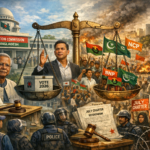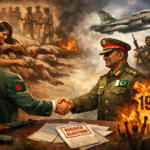Introduction: Is Pakistan’s Influence on Bangladesh a Persistent Question?Since the partition of the Indian subcontinent in 1947, South Asia has been a region marked by deep geopolitical tensions, rivalry, and covert operations. Pakistan, often at the centre of regional dynamics, has been involved in influencing its neighbours through intelligence operations, militant support, and propaganda. While its longstanding confrontations with Pakistan and involvement in Afghanistan have been well-documented, the question of its role in destabilising Bangladesh adds a new layer of complexity to the region’s geopolitics. Is there truth to allegations that Pakistan is fostering unrest, anti-India sentiment, and political instability in Dhaka?
This article delves into Pakistan’s potential activities in Bangladesh, urging a critical examination of the evidence of deep state interference and the motivations that might drive such actions. It’s crucial to question the claims of destabilization and consider whether this narrative is shaped by broader regional anxieties, or if there’s substantial evidence to support it.
Pakistan’s History of Deep State Activities: Is It Relevant Here?
Understanding Pakistan’s Deep State Activities: A Crucial Context for Our Analysis
- Countering India’s Influence:Pakistan’s rivalry with India is well-established, particularly in the context of Kashmir and nuclear deterrence. It’s clear that countering India’s growing influence in South Asia is a key strategic objective for Pakistan. Given Bangladesh’s close ties with India, might Pakistan see destabilizing Dhaka as a way to indirectly challenge New Delhi?
- Supporting Islamist Movements:Pakistan’s deep state has often used Islamist groups to exert influence in Afghanistan and India. Could similar strategies be at play in Bangladesh, where secularism is a key pillar of the ruling Awami League? Are Islamist groups like Jamaat-e-Islami being covertly supported by Pakistan, or is this a convenient narrative used to explain the rise of extremism in Bangladesh?
- Influencing Neighboring States:While Afghanistan and India have historically been Pakistan’s primary focus, some analysts suggest that Bangladesh has become a critical target as well. But how credible is the evidence that Pakistan is attempting to reestablish influence in Dhaka? Are there concrete links between Pakistani activities and the growing unrest in Bangladesh?
What Drives Pakistan’s Alleged Efforts to Destabilize Bangladesh?What would Pakistan have to gain from destabilizing Bangladesh? While Pakistan’s involvement remains contested, several potential motivations might help us understand the logic behind such actions, if they indeed exist.
- Historical Grievances:Bangladesh’s independence in 1971—following a brutal civil war and direct Indian intervention—was a major loss for Pakistan. Could Pakistan’s deep state be seeking to undermine Bangladesh as a means of addressing this historical humiliation? Does the shadow of the 1971 war still influence Pakistan’sapproach to Bangladesh?
- Countering India’s Growing Influence:Bangladesh has been aligning itself with India economically, diplomatically, and strategically. Given the importance of Bangladesh in India’s regional influence, could Pakistan’s efforts to destabilize Bangladesh be part of a broader strategy to counter Indian dominance? Would destabilizing Bangladesh create a strategic buffer against India’s growing power?
- Promoting Islamist Movements:Islamist groups in Bangladesh, particularly Jamaat-e-Islami, share ideological ties with movements in Pakistan. Could Pakistan’s support for these groups be part of a larger attempt to influence the political landscape of Bangladesh? Is it plausible that Pakistan is trying to replace the secular government with one that is more aligned with Islamist ideals?
- Geopolitical Interests in the Bay of Bengal:Bangladesh’s strategic position on the Bay of Bengal gives it access to vital maritime routes, as well as growing importance in regional geopolitics. Could control or influence over Bangladesh offer Pakistan an opportunity to challenge India’s dominance in this area? Is there a link between Pakistan’s alleged destabilization efforts and Bangladesh’s involvement in China’s Belt and Road Initiative?
Are There Tangible Methods of Destabilisation?
Even if Pakistan has motivations to destabilize Bangladesh, what methods might it use? What evidence exists that Pakistan’s deep state is actively working in Bangladesh, and how are these activities being carried out?
- Intelligence Operations and ISI’s Role:Pakistan’s ISI is often accused of infiltrating political groups and media organizations to foster unrest. Has the ISI successfully infiltrated Bangladesh’s political and religious networks? Is there clear evidence that Pakistani intelligence is playing a role in spreading anti-India sentiment or undermining the Bangladeshi government?
- Fostering Anti-India Sentiment:Pakistan has long tried to amplify anti-India rhetoric in South Asia. But how effective has it been in Bangladesh? Are there tangible signs that Pakistani-backed media outlets or social media campaigns are spreading disinformation, creating a wedge between Dhaka and New Delhi?
- Supporting Islamist Extremism:Pakistan has historically supported Islamist groups, but is it actively promoting such movements in Bangladesh? Can the rise of Islamist extremism in Bangladesh be directly linked to Pakistani influence, or are there domestic factors at play? Could Pakistan’s alleged support for groups like Jamaat-e-Islami be an effort to challenge the secular Awami League government?
- Economic Sabotage and Smuggling:Allegations of arms smuggling, drug trade, and counterfeit currency operations have been made against Pakistan in Bangladesh. But how substantial is the evidence that Pakistan’sdeep state is using these methods to destabilize Bangladesh’s economy? Could these activities be part of a broader strategy to create economic insecurity and political unrest?
- Media Manipulation and Disinformation:Media manipulation has become a key tool in modern geopolitical influence. Is Pakistan using this tactic in Bangladesh to discredit the government and spread pro-Pakistani narratives? Are Pakistani-backed cyber operations playing a role in spreading conspiracy theories and amplifying religious and political divisions in Bangladesh?
Are There Real-World Examples of Pakistan’s Influence?
Several specific incidents have raised concerns about Pakistan’s involvement in Bangladesh. But how credible are these claims, and what do these examples tell us about Pakistan’s potential role in destabilizing the country?
- The 2013 War Crimes Trials:Pakistan strongly opposed the war crimes trials held in Bangladesh in 2013, which targeted leaders of Jamaat-e-Islami. Could this be an indication of Pakistan’s deep connections to these Islamist groups? Did Pakistan support protests and violent demonstrations to disrupt the trials, or was the opposition more symbolic?
- Rise of Islamist Extremism:The rise of Islamist extremism in Bangladesh has been linked to various factors, but could Pakistan’s deep state be behind this trend? Have groups linked to Pakistan’s intelligence services been involved in extremist activities, or is this a case of attributing blame without solid evidence?
- Rohingya Refugee Crisis:The Rohingya refugee crisis has also been mentioned as a potential avenue for Pakistani influence. Are there credible reports of Pakistani operatives radicalizing refugees in Bangladesh’scamps, or is this narrative shaped by broader concerns over religious extremism?
Conclusion: Fact or Fiction?
So, is Pakistan truly involved in destabilizing Bangladesh? The evidence is mixed, with some clear motivations and historical precedents for Pakistan’s involvement in covert activities in the region. However, concrete proof of an active Pakistani role in Bangladesh remains limited, and many of the allegations may be influenced by broader regional tensions between India and Pakistan.
What remains clear is that the question of Pakistan’s influence in Bangladesh is one that requires careful scrutiny. As Bangladesh continues to grow as a strategic player in South Asia, the involvement of foreign powers—whether Pakistan, India, or China—will continue to shape its political landscape. The international community must remain vigilant, ensuring that Bangladesh’s sovereignty and stability are protected against covert interference.
So, is this portrayal of Pakistan as a destabilizing force in Bangladesh grounded in reality, or is it a reflection of regional anxieties and historical rivalries? Is there an underlying truth to these claims, or is it an overplayed narrative that obscures the real internal dynamics of Bangladesh? Could this be a combination of fact and fiction, strategically shaped by the agendas of multiple players? The truth remains elusive.






